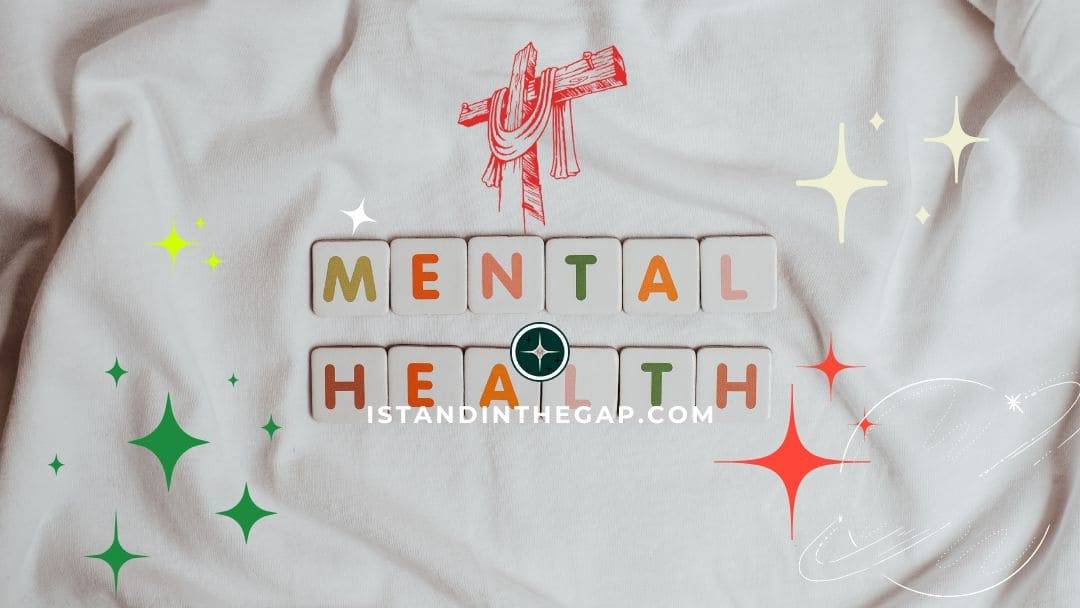Life can sometimes throw us into a whirlwind of challenges and uncertainties, and it’s no secret that our mental health can take a hit along the way. If you’re reading this article “divine biblical resources for mental health”, you’re not alone in facing those moments when your mind and heart feel like a stormy sea.
But here’s the good news: As believers, we have an incredible resource at our disposal, one that has withstood the test of time and provides wisdom, comfort, and unwavering support. That resource is the Bible.
In this blog post, we’re going to embark on a journey together, exploring the profound connection between faith and mental health. We’ll dive deep into the pages of the Bible to discover verses and passages that are like beacons of hope in the darkest of nights.
Our aim is simple yet profound: to uncover the timeless truths that can offer solace, guidance, and strength to those of us facing mental health challenges.
Key Takeaways to Divine Biblical Resources for Mental Health
- The Bible as a Source of Comfort: The Bible provides a timeless source of comfort, wisdom, and encouragement for individuals facing mental health challenges. It offers a range of verses and passages that address anxiety, fear, weariness, and despair, reminding readers of God’s presence and support in times of distress.
- Faith, Hope, and Healing: Through the verses discussed, the blog emphasizes the power of faith in finding hope and healing even in the midst of challenging circumstances. It highlights the importance of nurturing one’s faith through prayer, meditation, and community, as well as seeking professional help when needed, to maintain good mental health.
- God’s Unfailing Love and Compassion: The blog underscores the theme of God’s unwavering love and compassion as a source of strength and comfort during mental health struggles. It showcases real-life examples of individuals who have found solace in their faith and God’s enduring love, reminding readers that they are not alone in their journey toward mental well-being.
Why the Bible?
Now, you might be wondering, “Why turn to the Bible for help with my mental health?” Well, my friend, the Bible isn’t just a dusty old book of stories; it’s a living guidebook, a source of endless comfort, and a testament to the enduring love of our Creator. It’s a reminder that even in our most trying moments, we are not alone.
The Bible’s words have the power to mend the broken, soothe the anxious, and uplift the weary.
As we delve into these verses and passages, keep in mind that this blog post isn’t a substitute for professional mental health advice or treatment. It’s a supplement – a source of spiritual nourishment that can complement the other resources you may be utilizing on your journey to wellness.
So, whether you’re grappling with anxiety, depression, stress, or any other mental health challenge, let’s embark on this faith-filled exploration together. Let’s open our hearts to the timeless wisdom found within the pages of the Bible and discover how it can be a beacon of hope and healing on our path to mental well-being.
1. The Power of Prayer – Philippians 4:6-7
Be anxious for nothing, but in everything by prayer and supplication, with thanksgiving, let your requests be made known to God; and the peace of God, which surpasses all understanding, will guard your hearts and minds through Christ Jesus.
Now, let’s break down why these verses are a balm for the anxious soul. In a world where anxiety and worry often feel like unwelcome guests in our minds, Philippians 4:6-7 provides a clear roadmap to peace.
Firstly, it encourages us not to be anxious about anything. That’s a powerful statement in itself. It reminds us that our worries, no matter how overwhelming they may seem, are not too big for God to handle. Instead of carrying the weight of our concerns alone, we’re invited to bring them to God through prayer.
The act of prayer, as described here, involves not just laying out our requests but doing so with thanksgiving. This is where the magic happens. When we approach God with a heart full of gratitude, it shifts our perspective. It helps us focus on the blessings and goodness in our lives, even amidst the challenges. And when we lay our worries before Him, something incredible occurs – the peace of God, which surpasses our understanding, takes guard over our hearts and minds through Christ Jesus.
Imagine this peace as a powerful shield, guarding your heart and mind from the constant barrage of anxious thoughts and worries. It’s a peace that goes beyond human comprehension. It’s a peace that brings calm to the storm, soothing the turbulent waters of your mind.
But don’t just take my word for it. There are countless stories of individuals who have found solace and strength through prayer during their darkest hours. Whether it’s someone facing a medical crisis, financial difficulties, or the weight of daily stressors, prayer has been a lifeline for many. It’s not about the words you use or the eloquence of your prayers; it’s about the sincere connection you forge with the Divine.
So, my friend, I encourage you to incorporate prayer into your daily life, not as a last resort but as a daily practice for mental well-being. Take a moment to be still, offer your worries to God, and remember to thank Him for the blessings in your life. As you do, may the peace of God, that beautiful and inexplicable peace, become a steadfast guardian of your heart and mind, helping you navigate the challenges of mental health with grace and faith.
2. God’s Nearness in Tough Times – Psalm 34:17-18
The righteous cry out, and the Lord hears and delivers them out of all their troubles. The Lord is near to those who have a broken heart and saves such as have a contrite spirit.
These verses are a beacon of hope for anyone going through tough times, especially those who are grappling with a broken heart or a heavy spirit. They remind us of a profound truth: God is not a distant deity observing our struggles from afar. No, He is close, nearer than we might imagine, especially to those who are hurting.
When life’s storms hit, and our hearts break under the weight of pain, it’s easy to feel alone and abandoned. But Psalm 34:17-18 assures us that God is right there beside us, listening to our cries. He doesn’t turn a deaf ear to our anguish; He hears, and He responds.
This divine proximity is a source of immense comfort. Think of it this way: When a loved one is going through a tough time, our presence alone can provide solace, even without words. In the same way, God’s nearness to the brokenhearted is a soothing presence, offering a sense of peace in the midst of turmoil.
Now, there are stories of real-life accounts of individuals who have experienced God’s deliverance in their darkest hours. It’s not uncommon to hear tales of people who found strength they didn’t know they had, courage to face adversity, and even unexpected solutions to seemingly insurmountable problems, all through their faith and God’s presence.
Such stories are a testament to the truth of Psalm 34:17-18. They remind us that even in our lowest moments, when our hearts are heavy and our spirits contrite, God is our refuge and our deliverer. He doesn’t leave us stranded in our troubles; He rescues us and carries us through.
So, when you find yourself in the midst of life’s storms when your heart feels broken, and your spirit is heavy, remember these verses. Draw near to God, seek His presence in prayer, and let His nearness bring you the comfort and strength you need. Just as He has been there for countless others, He is there for you, ready to save and deliver you from all your troubles.
3. God’s Strength in Times of Fear – Isaiah 41:10
So do not fear, for I am with you; do not be dismayed, for I am your God. I will strengthen you and help you; I will uphold you with my righteous right hand.
These verses offer profound reassurance when we find ourselves in the grip of fear and anxiety. They are a gentle yet powerful reminder of God’s unwavering presence and His willingness to be our source of strength in times of weakness.
Picture this: You’re standing on the edge of a deep, dark chasm, your heart heavy with fear. The unknown lies before you, and your mind races with worry. But then, you hear a comforting voice – the voice of God Himself – saying, “Do not fear, for I am with you.” It’s as if a warm, reassuring hand is placed on your shoulder, and suddenly, the fear begins to lose its grip.
Isaiah 41:10 doesn’t just offer words of comfort; it provides us with practical guidance on how to navigate fear. It encourages us not to be dismayed, for God is our God. This means that no matter how overwhelming the situation may seem, God is in control. We can trust Him with our fears and concerns, knowing that He has a plan and purpose even in the midst of our anxiety.
So, how can we lean on God’s strength when confronted with fear?
- One practical way is through prayer and meditation on His promises. When fear creeps in, take a moment to pray, surrendering your worries to God. Ask Him for the strength to face your fears and trust that He will provide.
- Additionally, meditate on the promises found in Isaiah 41:10. Imagine God upholding you with His righteous right hand like a loving parent lifting a child over a challenging obstacle. This mental image can bring a sense of peace and confidence, knowing that you are not alone in your struggles.
In essence, trusting in God’s promises can be like an anchor for your soul in the stormy seas of fear and anxiety. It’s a reminder that you don’t have to face these challenges on your own. God is with you, ready to strengthen, help, and uphold you. So, whenever fear knocks on your door, open it with faith, and let God’s promises flood your heart with peace and confidence.
4. Finding Rest in Christ – Matthew 11:28-30
Come to Me, all you who labor and are heavy laden, and I will give you rest. Take My yoke upon you and learn from Me, for I am gentle and lowly in heart, and you will find rest for your souls. For My yoke is easy, and My burden is light.
These verses hold an invitation – a heartfelt invitation from Jesus Himself. It’s an invitation to find rest in the midst of life’s toils and burdens, an invitation to experience a different kind of yoke – a yoke that doesn’t weigh you down but lifts you up.
Imagine a weary traveler, burdened by the weight of their struggles, stumbling upon an oasis in the desert. Jesus is that oasis, and He extends His hand to anyone who feels weary and heavy-laden. He says, “Come to Me,” inviting us to lay down our burdens at His feet.
But what does Jesus mean by His “easy yoke”? The yoke was a common agricultural tool in His time, used to join two animals together for work. Jesus is offering us a partnership – a partnership where He takes the heavier end of the yoke. He’s not asking us to carry life’s burdens alone; He’s inviting us to share the load with Him.
When you accept this invitation, you’ll find that the yoke is easy because Jesus is a gentle and compassionate guide. He doesn’t drive you relentlessly; He leads with care and understanding. His heart is humble and His approach is tender. In Him, you’ll discover rest not just for your body but for your very soul.
Oftentimes, we hear powerful stories of people who have experienced finding rest in Christ, and it’s a reminder that Jesus’ invitation is not a mere promise but a reality. People have experienced inner peace, hope, and a sense of purpose that transcends their circumstances. Their burdens became lighter, their hearts found rest, and their lives were transformed.
So today, I encourage you to seek solace in Jesus during your times of weariness. When life’s demands become overwhelming, remember His words. Come to Him, lay your burdens down, and take up His easy yoke. Find rest for your soul in the loving embrace of the One who understands your struggles and is ready to walk beside you. It’s an invitation that has brought comfort to countless souls, and it’s extended to you today.
5. Hope and Joy in Believing – Romans 15:13
Now may the God of hope fill you with all joy and peace in believing, that you may abound in hope by the power of the Holy Spirit.
These words are like a ray of sunlight breaking through the clouds on a gloomy day. They remind us that even in the most challenging circumstances, faith can be a source of hope, joy, and peace. But how does that work, you might wonder?
Faith, my friend, is a powerful force. It’s like a sturdy anchor that keeps your boat steady amidst the turbulent waters of life. When you believe, truly believe, you tap into a wellspring of hope. You recognize that there is a God of hope, a divine source of optimism, no matter how dire the situation may seem.
As you nurture your faith, you find that joy and peace accompany it. This isn’t the kind of happiness that depends on external circumstances; it’s a deep, abiding joy that flows from knowing you’re held in the loving embrace of the Creator. It’s the peace that surpasses understanding, the calm in the midst of life’s storms.
So, how can you nurture your faith and find joy in believing? It starts with spending time in prayer and meditation. Just as you water a plant to help it grow, you can nurture your faith by communing with God regularly. Read the Bible, engage in meaningful conversations with God, and seek understanding and wisdom in His words.
Additionally, surround yourself with a community of believers who can uplift and encourage you on your faith journey. Sharing your beliefs and experiences with others can reinforce your sense of hope and joy.
Above all, trust in God’s power to fill you with hope and peace. Remember that He is the God of hope, and His Holy Spirit is a wellspring of strength. Allow your faith to be the vessel through which His hope and peace flow into your life.
So, beloved, I encourage you to trust in the power of faith. Let it be your wellspring of hope and joy, especially in challenging times. As you believe, may the God of hope fill you with an abundance of joy and peace, and may your life abound in hope, guided by the power of the Holy Spirit.
6. Our Bodies as Temples – 1 Corinthians 6:19-20
Do you not know that your bodies are temples of the Holy Spirit, who is in you, whom you have received from God? You are not your own; you were bought at a price. Therefore honor God with your bodies.
These verses offer a compelling perspective on the importance of caring for both our physical and mental well-being. They remind us that our bodies are not just vessels for our earthly existence; they are temples, sacred spaces indwelt by the Holy Spirit.
Imagine your body as a beautifully adorned temple, a place where the divine presence resides. This realization brings a profound sense of responsibility. Just as we would care for a physical place of worship, we are called to care for our bodies, both physically and mentally.
Caring for our mental health is an integral part of honoring God with our bodies. It involves recognizing that our minds, like our bodies, are part of this sacred temple. Just as we wouldn’t neglect the maintenance of a church, we shouldn’t neglect the care of our mental and emotional well-being.
Practical suggestions for maintaining good mental health include:
- Practicing self-care,
- Seeking professional help when needed, and
- Nurturing a support system.
Self-care can involve activities like:
- Mindfulness,
- Exercise,
- Getting enough rest, and
- Engaging in hobbies that bring joy and relaxation.
Seeking professional help, such as therapy or counseling, is a courageous step towards healing when facing mental health challenges.
It’s essential to remember that seeking help is not a sign of weakness but a testament to your commitment to honor God with your body and mind. Just as you wouldn’t hesitate to seek help for a physical ailment, seeking help for mental health issues is a responsible and faithful action.
In summary, 1 Corinthians 6:19-20 reminds us of our sacred duty to care for both our physical and mental well-being. Our bodies are not our own; they are temples of the Holy Spirit. So, let us honor God with our bodies by nurturing good mental health, seeking help when needed, and recognizing the divine importance of our mental and emotional well-being.
7. God’s Everlasting Love – Lamentations 3:22
In the final stretch of our journey through biblical resources for mental health, let’s turn our gaze to Lamentations 3:22
Through the Lord’s mercies we are not consumed, because His compassions fail not.
These words are like a gentle whisper of reassurance, reminding us of the unwavering love and compassion of our Heavenly Father. In times of distress and mental anguish, it’s easy to feel overwhelmed, but Lamentations 3:22 serves as a steadfast anchor for our souls.
Imagine God’s love as an eternal flame that never wavers, even in the darkest of nights. It’s a love that doesn’t discriminate or diminish based on our circumstances or struggles. Rather, it’s a love that holds us, comforts us, and assures us that we will not be consumed by the trials we face.
Countless believers have found strength and solace in the midst of mental health challenges through God’s enduring love. They have felt the loving embrace of a compassionate Creator who walks with them through the darkest valleys. They have experienced moments of divine comfort and peace that transcended their understanding.
These stories are a testament to the truth of Lamentations 3:22. They remind us that even when our mental health feels fragile, God’s love is unbreakable. His compassions never fail, and His mercy is a wellspring of hope.
So, my friend, I encourage you to meditate on God’s love, especially during times of distress. Reflect on the profound truth that His love is constant, His compassions never-ending. Trust in His compassion, and let it be a source of strength and comfort as you navigate the challenges of mental health. Just as countless others have found solace in His love, may you too find peace in the embrace of a loving and compassionate God.
Conclusion
As we conclude our journey through the rich biblical resources for mental health, let’s take a moment to recap the key takeaways from each of the Bible verses and passages we’ve explored.
1. Philippians 4:6-7 – The Power of Prayer
- Prayer is a powerful tool for finding peace in the midst of anxiety and worry.
- Present your requests to God with thanksgiving, and His peace will guard your heart and mind.
2. Psalm 34:17-18 – God’s Nearness in Tough Times
- God is near to those with broken hearts and saves those with contrite spirits.
- Even in your lowest moments, God is close and ready to rescue you.
3. Isaiah 41:10 – God’s Strength in Times of Fear
- Do not fear, for God is with you, and He will strengthen and uphold you.
- Trust in God’s promises and find peace and confidence in His presence.
4. Matthew 11:28-30 – Finding Rest in Christ
- Jesus invites us to find rest in Him and take up His easy yoke.
- Many have found relief from life’s burdens through their relationship with Christ.
5. Romans 15:13 – Hope and Joy in Believing
- Faith provides hope, joy, and peace, even in challenging circumstances.
- Nurturing faith through prayer, scripture, and community can bring abounding hope.
6. 1 Corinthians 6:19-20 – Our Bodies as Temples
- Our bodies are temples of the Holy Spirit, requiring care for physical and mental well-being.
- Seek self-care, and professional help when needed, and honor God with your body and mind.
7. Lamentations 3:22 – God’s Everlasting Love
- God’s love and compassion are unwavering sources of comfort during distress.
- Countless individuals have found strength in God’s enduring love during mental health challenges.
In conclusion, the Bible offers a profound foundation of faith and hope for those navigating mental health challenges as believers. These verses remind us that God is not distant but is with us, offering solace, strength, and healing. They assure us that even in our lowest moments, His love and compassion remain steadfast.
I encourage you, dear reader, to turn to these verses for guidance and support in your journey to overcome mental health challenges. May they serve as beacons of hope and sources of strength as you navigate the storms of the mind. In the face of adversity, let faith be your anchor, and may the promises of the Bible be a wellspring of comfort and assurance. Remember, you are not alone, and there is hope in your journey towards mental well-being.
Frequently Asked Questions (FAQs)
What is mental health?
Mental health refers to a person’s emotional, psychological, and social well-being. It encompasses their ability to handle stress, maintain relationships, work productively, and make decisions.
Is seeking help for mental health issues a sign of weakness?
No, seeking help for mental health concerns is a sign of strength and self-awareness. Just as you’d seek medical help for a physical ailment, it’s important to seek professional support for mental health challenges.
Can faith and spirituality play a role in mental health recovery?
Yes, faith and spirituality can be valuable resources for mental health recovery. Many find solace, hope, and support in their religious or spiritual beliefs and practices.
What are some self-care practices for maintaining good mental health?
Self-care practices include regular exercise, a balanced diet, sufficient sleep, mindfulness meditation, engaging in hobbies, spending time with loved ones, and setting boundaries.
When should I consider therapy or counseling for mental health issues?
Consider therapy or counseling when you’re experiencing persistent emotional distress, overwhelming anxiety, depression, difficulty functioning in daily life, or when you need support in managing life transitions or trauma. Seeking professional help is a proactive step toward mental well-being.

















